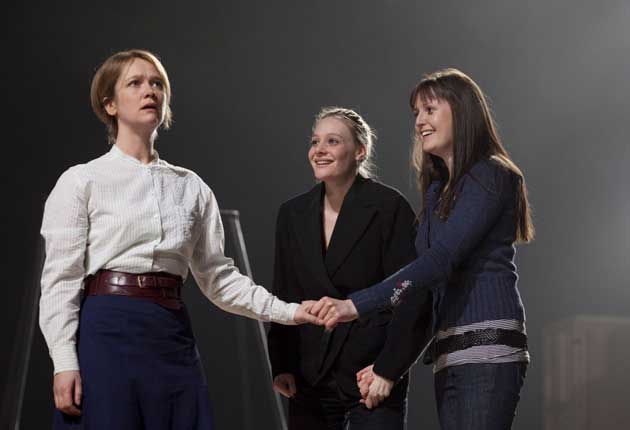Three Sisters, Lyric, Hammersmith, London
A thoroughly modern Chekhov

Your support helps us to tell the story
From reproductive rights to climate change to Big Tech, The Independent is on the ground when the story is developing. Whether it's investigating the financials of Elon Musk's pro-Trump PAC or producing our latest documentary, 'The A Word', which shines a light on the American women fighting for reproductive rights, we know how important it is to parse out the facts from the messaging.
At such a critical moment in US history, we need reporters on the ground. Your donation allows us to keep sending journalists to speak to both sides of the story.
The Independent is trusted by Americans across the entire political spectrum. And unlike many other quality news outlets, we choose not to lock Americans out of our reporting and analysis with paywalls. We believe quality journalism should be available to everyone, paid for by those who can afford it.
Your support makes all the difference.Even the finest productions of Chekhov in this country can sometimes make you feel that the English are treating him as an honorary English gentleman and misrepresenting his world as a pre-revolutionary sepia-tinted Edwardian ideal, in that platonic summer-before-the-war that has everything to do with us and little to do with him.
So it's immensely refreshing that the excellent Filter collective have here collaborated with Sean Holmes, the new artistic director of the Lyric Hammersmith, on a production of Three Sisters that scraps all the pseudo-refinement, the costume-drama safety net and the microclimate of understated realism. But don't think that they have put on a manual on deconstruction where the mood-swinging bipolar spirit of the play should be or that they have replaced with a set of crude larks the enormous subtlety with which the play orchestrates its shifting conflicted atmospheres and its sense of conversation as the criss-crossing of competing monologues.
So: the clothes are contemporary/ timeless; the casting is more what you would get for a play at the Royal Court (and there are some terrific performances but not of the laughter-through-a-mist-of-tears, fluting kind that fool the givers of awards). The production deploys a range of fluid performance styles that give a Chekhovian twist to situations that might have strayed here from genres as they have developed since his day. The invented bit where the drunken doctor Chebutykin (excellent Nigel Cooke) casually pees in the wardrobe during the fire-emergency scene goes to the core of the negligence with which this past-it medic inflicts his half-thinking emotional havoc. And the fact that the determinedly "happy" schoolteacher Kulygin (spot-on Paul Brennen) happens to be secreted in the wardrobe during the pissing episode renders the moment all the more neo-Chekhovian as we see him wince and try to make himself invisible. It's true to his character that he feels embarrassed not for Chebutykin and his boorishness but because he does not want Chebutykin to be embarrassed by noticing his presence.
The production uses space and sound with a sometimes Expressionist expressiveness. When Romola Garai's sexily anguished Masha announces, with brave defiance, that she is in love with John Lightbody's ecstatically frustrated Vershinin, Olga (Poppy Miller) stalks off, so as not to hear her, into the vast wastes of the stripped-back Lyric stage that surround the central huddle of furniture that creates the scene. Amplified noises such as of a boiling kettle that sounds like a bosh shot at the noise of the Second Coming drive probes into the psychological underlay of each particular situation. Sometimes you feel that it is like watching a collage of "quotes" and then it all coheres again.
Sometimes you have the impression that the first performers of the piece have been speeded through, by a kind of time-lapse photography, into becoming their contemporary equivalents. Then it so sweeps you into a fresh sense of the world of Chekhov, that questions of technique seem by the by. Warmly recommended.
To 20 February (0871 22 117 29) then on tour ( Filtertheatre.com)
Join our commenting forum
Join thought-provoking conversations, follow other Independent readers and see their replies
Comments